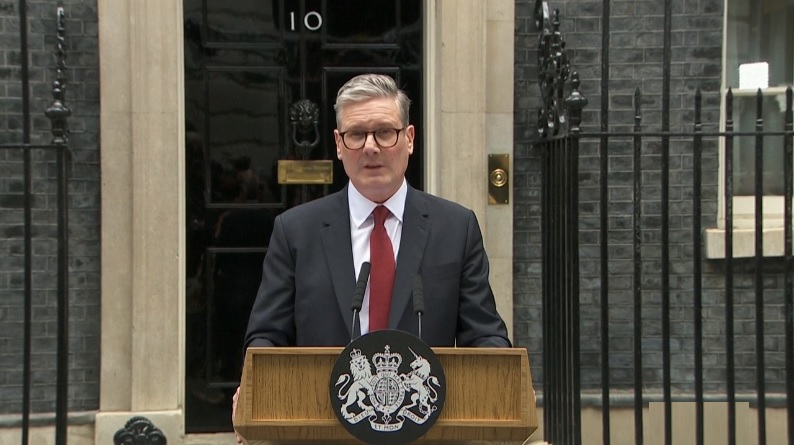Keir Starmer Promises “Government of Service” Following Labour’s Landslide Victory
British Prime Minister Keir Starmer has vowed to lead a “government of service” dedicated to national renewal in his first official remarks after the Labour Party’s resounding victory. After more than a decade in opposition, Labour’s win marks a significant shift in British politics.
Addressing supporters outside 10 Downing Street, Starmer acknowledged the widespread disillusionment with politics but promised to restore faith in government. “My government will make you believe again,” he declared as cheers erupted from the crowd. He emphasized that the work for change would begin immediately, pledging to rebuild Britain “brick by brick.”
In a swift transition characteristic of British politics, Starmer assumed residence at 10 Downing Street just hours after Conservative leader Rishi Sunak and his family vacated. Sunak, conceding defeat earlier in the day, delivered a reflective farewell speech, acknowledging his missteps and taking responsibility for the loss. “I have heard your anger, your disappointment, and I take responsibility for this loss,” Sunak stated.
Labour’s victory is monumental, with the party securing 410 seats in the 650-seat House of Commons, while the Conservatives managed only 118. Despite the triumph, Starmer faces significant challenges, including addressing economic malaise, distrust in institutions, and social fragmentation.
London voter James Erskine expressed optimism for change, hoping for a “seismic shift.” Anand Menon, a professor of European Politics at King’s College London, anticipates a return to more stable governance, contrasting the tumultuous “politics as pantomime” of recent years.
The UK has endured turbulent years, exacerbated by the Conservatives’ policies and external factors. The Brexit process, the COVID-19 pandemic, and Russia’s invasion of Ukraine have battered the economy. Political scandals, such as lockdown-breaching parties under Boris Johnson, further eroded public trust.
Rising poverty, crumbling infrastructure, and an overstretched National Health Service have contributed to the perception of a “Broken Britain.” Johnson’s successor, Liz Truss, exacerbated economic woes with drastic tax cuts, leading to her brief 49-day tenure. Many senior Tories, including Truss, lost their seats in this stark electoral reckoning.
The election results reflect a volatile public mood, with smaller parties gaining significant support. The centrist Liberal Democrats secured about 70 seats, while Nigel Farage’s Reform UK won four seats, including Farage’s first parliamentary victory in Clacton-on-Sea. The Green Party also increased its representation to four seats.
The Scottish National Party (SNP), once dominant in Scotland with 57 seats, faced significant losses, primarily to Labour.
Keir Starmer’s promise of a “government of service” aims to address the myriad challenges facing Britain. As the new administration begins its tenure, the political landscape of the UK stands transformed, with high expectations for change and renewal.
Stay tuned for further updates as Starmer’s government embarks on its mission to rebuild and restore faith in British politics.



